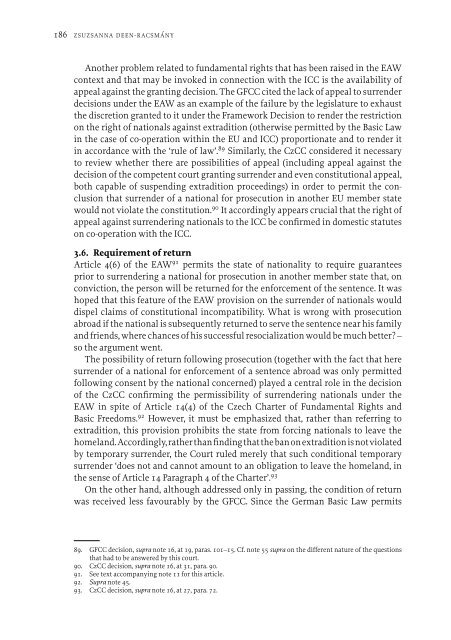Lessons of the European Arrest Warrant for Domestic ...
Lessons of the European Arrest Warrant for Domestic ...
Lessons of the European Arrest Warrant for Domestic ...
Create successful ePaper yourself
Turn your PDF publications into a flip-book with our unique Google optimized e-Paper software.
186 ZSUZSANNA DEEN-RACSMÁNYAno<strong>the</strong>r problem related to fundamental rights that has been raised in <strong>the</strong> EAWcontext and that may be invoked in connection with <strong>the</strong> ICC is <strong>the</strong> availability <strong>of</strong>appeal against <strong>the</strong> granting decision. The GFCC cited <strong>the</strong> lack <strong>of</strong> appeal to surrenderdecisions under <strong>the</strong> EAW as an example <strong>of</strong> <strong>the</strong> failure by <strong>the</strong> legislature to exhaust<strong>the</strong> discretion granted to it under <strong>the</strong> Framework Decision to render <strong>the</strong> restrictionon <strong>the</strong> right <strong>of</strong> nationals against extradition (o<strong>the</strong>rwise permitted by <strong>the</strong> Basic Lawin <strong>the</strong> case <strong>of</strong> co-operation within <strong>the</strong> EU and ICC) proportionate and to render itin accordance with <strong>the</strong> ‘rule <strong>of</strong> law’. 89 Similarly, <strong>the</strong> CzCC considered it necessaryto review whe<strong>the</strong>r <strong>the</strong>re are possibilities <strong>of</strong> appeal (including appeal against <strong>the</strong>decision <strong>of</strong> <strong>the</strong> competent court granting surrender and even constitutional appeal,both capable <strong>of</strong> suspending extradition proceedings) in order to permit <strong>the</strong> conclusionthat surrender <strong>of</strong> a national <strong>for</strong> prosecution in ano<strong>the</strong>r EU member statewould not violate <strong>the</strong> constitution. 90 It accordingly appears crucial that <strong>the</strong> right <strong>of</strong>appeal against surrendering nationals to <strong>the</strong> ICC be confirmed in domestic statuteson co-operation with <strong>the</strong> ICC.3.6. Requirement <strong>of</strong> returnArticle 4(6) <strong>of</strong> <strong>the</strong> EAW 91 permits <strong>the</strong> state <strong>of</strong> nationality to require guaranteesprior to surrendering a national <strong>for</strong> prosecution in ano<strong>the</strong>r member state that, onconviction, <strong>the</strong> person will be returned <strong>for</strong> <strong>the</strong> en<strong>for</strong>cement <strong>of</strong> <strong>the</strong> sentence. It washoped that this feature <strong>of</strong> <strong>the</strong> EAW provision on <strong>the</strong> surrender <strong>of</strong> nationals woulddispel claims <strong>of</strong> constitutional incompatibility. What is wrong with prosecutionabroad if <strong>the</strong> national is subsequently returned to serve <strong>the</strong> sentence near his familyand friends, where chances <strong>of</strong> his successful resocialization would be much better? –so <strong>the</strong> argument went.The possibility <strong>of</strong> return following prosecution (toge<strong>the</strong>r with <strong>the</strong> fact that heresurrender <strong>of</strong> a national <strong>for</strong> en<strong>for</strong>cement <strong>of</strong> a sentence abroad was only permittedfollowing consent by <strong>the</strong> national concerned) played a central role in <strong>the</strong> decision<strong>of</strong> <strong>the</strong> CzCC confirming <strong>the</strong> permissibility <strong>of</strong> surrendering nationals under <strong>the</strong>EAW in spite <strong>of</strong> Article 14(4) <strong>of</strong> <strong>the</strong> Czech Charter <strong>of</strong> Fundamental Rights andBasic Freedoms. 92 However, it must be emphasized that, ra<strong>the</strong>r than referring toextradition, this provision prohibits <strong>the</strong> state from <strong>for</strong>cing nationals to leave <strong>the</strong>homeland.Accordingly,ra<strong>the</strong>rthanfindingthat<strong>the</strong>banonextraditionisnotviolatedby temporary surrender, <strong>the</strong> Court ruled merely that such conditional temporarysurrender ‘does not and cannot amount to an obligation to leave <strong>the</strong> homeland, in<strong>the</strong> sense <strong>of</strong> Article 14 Paragraph 4 <strong>of</strong> <strong>the</strong> Charter’. 93On <strong>the</strong> o<strong>the</strong>r hand, although addressed only in passing, <strong>the</strong> condition <strong>of</strong> returnwas received less favourably by <strong>the</strong> GFCC. Since <strong>the</strong> German Basic Law permits89. GFCC decision, supra note 16, at 19, paras. 101–15. Cf. note 55 supra on <strong>the</strong> different nature <strong>of</strong> <strong>the</strong> questionsthat had to be answered by this court.90. CzCC decision, supra note 16, at 31, para. 90.91. See text accompanying note 11 <strong>for</strong> this article.92. Supra note 45.93. CzCC decision, supra note 16, at 27, para. 72.
















